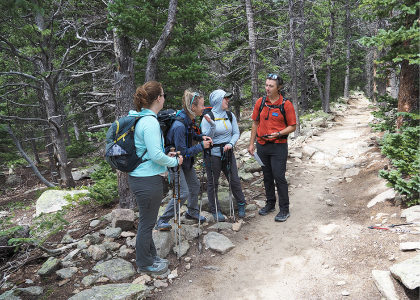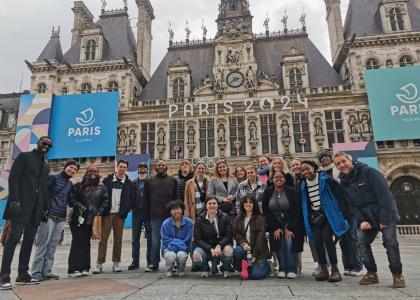Undergraduate Program Goals
Learning objectives for the CORE RPTM curriculum
- Students will demonstrate an understanding of the roles and significance of leisure and recreation in past and present societies, knowledge of the factors contributing to the emergence of specific movements, delivery systems, and agencies within the recreation and parks movement.
- Students will demonstrate an understanding of the societal, definitional, and theoretical contexts of recreation/leisure service leadership and group facilitation by demonstrating effective group leadership and interpersonal communication.
- Students will work collaboratively to design, promote, implement, and evaluate a special event that will benefit participants and the sponsoring agency of the event. Students will demonstrate knowledge of key concepts in program planning, the decision factors involved in analyzing and designing a recreation program or special event, as well as the skills associated with management functions.
- Students will demonstrate their understanding of marketing principles useful to designing and selling recreation experiences and the ability to apply marketing principles to the development of effective marketing strategies and tactics.
Learning Goals or Outcomes for RPTM Majors
Commercial/Community Recreation Management Option
Students who complete an undergraduate major in RPTM with a Commercial/Community Recreation Management Option will have demonstrated the ability to:
- Assess social, environmental, political, and economic benefits and demerits of tourism development.
- Develop a comprehensive recreation and tourism business plan taking into consideration an understanding of the strategic management process and how that process applies to the for-profit recreation industry.
- Develop strategic management decisions for non-profit and for-profit recreation/tourism organizations grounded in the analysis of market, financial, legal, and political environment.
- Present their ideas through writing and public speaking in a manner that conveys professional competence and technical expertise.
Outdoor Recreation Option
Students who complete an undergraduate major in RPTM with an Outdoor Recreation Option will have demonstrated the ability to:
Environmental Interpretation Track
- Show awareness of the history, professional resources, and best practices in the field of environmental interpretation.
- Access sources of information and materials for environmental education content and methods.
- Develop a working knowledge of the philosophy, history, content resources, and current methodology trends in the field of environmental education.
Adventure Programming Track
- Show familiarity with outdoor leadership principles and begin to develop skills in decision-making, judgment, program design, and group facilitation.
- Plan, organize, implement, and evaluate outdoor experiential education programs.
Park Management Track
- Provide input into the planning and design of indoor and outdoor recreation and park facilities, and the ability of operate such facilities in a safe, efficient, and cost-effective manner.
- Acquire and effectively manage fiscal and human resources in the operation of a public-sector recreation and park agency.
PGA Professional Golf Management Option
Students who complete an undergraduate major in RPTM with a PGA Professional Golf Management Option will have demonstrated the ability to:
- Assess leadership and management principles including customer service, interpersonal skills, business communication, conflict resolution, time management, negotiating, project management, marketing, and community relations.
- Evaluate basic concepts of financial and managerial accounting, along with accounting rules and techniques associated with business transactions and financial statements.
- Show how to manage human resources including employment law, job descriptions, and performance standards; evaluating and improving employee performance; recruiting and employee training programs; employee benefit programs; and contracts.
- Develop basic food and beverage principles including ordering and inventory control, labor costs, calculating menu prices, health regulations and permits, and licensing and liability laws.
- Implement principles and preferences of teaching including club design and fitting; ball flight laws, recruiting and retaining clients; utilizing technology for teaching and club fitting; analyzing, communicating, correcting, and coaching; developing junior golf programs; and applying the rules of golf.
- Assess retail management including advertising and branding strategies, market and competition, sales forecast and inventory budgets, merchandise assortment plan, vendor selection, open-to-buy plan, performance measurements, inventory software applications, inventory control, and display technology.
Our action plan for meeting these activities includes:
- Traditional course work and assignments
- Experiential and engaged education through “hands on learning” such as study abroad, Outdoor School, support and planning of community events, pre-internship and internship experiences
- Extracurricular activities such as the PGM Student Society and RPTM Student Society
- Professional development activities such as attendance at conferences, guest speakers, independent study, and student support and involvement in of faculty research
How do we know if RPTM graduates have met these objectives?
- We ask students who are graduating to complete a self-assessment in a senior exit survey.
- We survey internship agency supervisors to gather data about student performance including areas of strength and areas that provide opportunities to improve.
- We review course evaluations (SRTEs) and feedback from students on applicability and delivery of course materials.
- We meet with alumni and other “friends of the RPTM program” formally and informally to solicit feedback on student progress and include feedback in our curriculum reviews.



